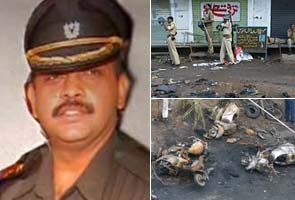
The intelligence officer, who is 39 years old, was arrested in November 2008 for murder and conspiracy in the terror attack that saw six people die in September that year in the communally-sensitive town of Malegaon. A bomb placed on a motorcycle exploded after Friday prayers had ended at a mosque.
As Maharashtra's Anti-Terror Squad began investigating Purohit's links to Hindu radical groups, the Army convened a Court of Inquiry. It was the first time that a serving officer had been arrested for a terror attack. However, the Court of Inquiry was incomplete since. Lt Col Purohit had not been given the mandatory opportunity to cross-examination of the witnesses.
When the Army denied him the chance to cross question, Purohit moved the Principal bench of the Armed Forces Tribunal (AFT), which is now deemed equivalent to a High Court, seeking redressal.
In his application to the AFT, Purohit listed out the bias, illegal detention, torture and physical abuse by a fellow military intelligence official bent on implicating him in the saffron terror cases.
Purohit also drew the AFT's attention to the fact that almost a fortnight before his arrest, he had alerted Military Intelligence about the activities of Hindu radicals in Madhya Pradesh and Maharashtra, on the basis of information he had gathered during his tenure as an intelligence officer posted in Deolali near Malegaon and Nasik
Now, the Armed Forces Tribunal has ruled that the Court of Inquiry has to be reconvened because it did not allow Purohit the opportunity to cross-question some witnesses.
Purohit had petitioned the Tribunal in August 2009, alleging that he was not being given a fair trial by the Army. He said that he had been denied basic rights - like cross-examination - and that he was being victimised.
When Purohit was arrested, he was accused of having stolen 60 kg of RDX from the Army - some of which was used in the Malegaon blast. He was also charged with funding and training Hindu extremist groups like Abhinav Bharat, which was believed to have planned and executed the Malegaon blasts.
Purohit's version of events is very different. He has told the Army that 15 days before he was arrested, while he was based at Panchmarhi Madhya Pradesh, he had written to another intelligence official named Major B Dey, who was stationed nearby in Jabalpur. In that letter, he drew Major Dey's attention to the activities of RSS leader Indresh Kumar and Sadhvi Pragnya Singh Thakur, who led a right-wing organization named Jai Vandeu Mataram. The Sadhvi would end up being arrested a few days before Purohit for her alleged involvement in the Malegaon blast. Purohit provided the Army Tribunal with a copy of this letter.
Purohit has claimed all along that at postings in Nashik in Maharashtra and later at Panchmarhi, he mingled with radical outfits because that was his job - to collect intelligence.
Four days before he was arrested by the Maharashtra Anti-Terror Squad, Purohit claims a fellow officer, Colonel RK Shrivastav, conned him into travelling to Mumbai with him. Purohit claims he was illegally detained there by Shrivastav, Intelligence Bureau officers, and the Anti-Terror Squad, who tortured him. Purohit believes Shrivastav hoped to earn recognition and promotion for handing over a prized suspect to the police.
The evidence by then had begun piling up against him. The Anti-Terror Squad said that others who had been arrested had implicated Purohit, and that there was evidence that he had supplied the RDX for the Malegaon attack. It also claimed to have recovered incriminating SMSes sent by Purohit immediately after the blast.
Purohit's version has been reinforced partly by the arrest of Swami Aseemanand in November last year for his alleged involvement in a blast at Hyderabad's Mecca Masjid in 2007 in which nine people were killed.
In December last year, Aseemanand told a Delhi court that Hindu radical groups that he worked with were also responsible for other terror attacks in 2007 like a blast at the Ajmer Dargah in Rajasthan and the Samjhauta Express explosion where 68 people were killed on a train headed from Delhi to Lahore.
Aseemanand said Malegaon had been targeted twice by his associates and him - once in 2008 and before that in 2006, when 31 people had died. And like Purohit, Aseemanand implicated RSS leader Indresh Kumar.
Given the fact that the Army is now re-evaluating Purohit's innocence, the investigations into the series of attacks associated with "saffron terror" may have to be reconfigured. The National Investigation Agency (NIA) has been asking that it be placed in charge of all the inquiries - currently being coordinated by the CBI, the police in the states where the attacks took place, and in the case of the Samjhauta Express, the NIA.
No comments:
Post a Comment